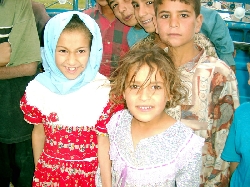
An assessment conducted by International Medical Corps
Tyler Marshall, International Medical Corps, 202-828-5155, tmarshall@imcworldwide.org
Photo: Children in Nasiriyah, by Sheri Fink; hi-resolution version
The study finds that residents of the Iraq capital account for about 80% of the 546,078 Iraqis civilians who have already fled their homes because of the sectarian fighting in the 11 months since the Feb. 2006 bombing of the Holy Shrine in Samara. The pace of those fleeing is accelerating at a dramatic rate. Since November alone, the number of those displaced has jumped by 43%.
The humanitarian situation is deteriorating at an increasingly rapid rate and there are few indicators of any change in this trend in the short term. While often over-used, the words "humanitarian crisis" accurately describe conditions now unfolding inside
"It is a brewing humanitarian crisis of enormous proportions that is being overshadowed by the fighting itself and the debate surrounding the war," said Nancy Aossey, IMC's President and CEO. "It must be acknowledged and addressed."
The population movement constitutes a large-scale reshaping of the city's neighborhoods along sectarian lines. Some of the displaced have sought refuge with family or friends in "sectarian friendly" neighborhoods within the capital, while others have fled the capital altogether to outlying governorates.
Unlike the temporary displacement of civilians that occurred prior to Feb. 2006—displacements often caused by military operations such as those conducted in 2004-5 in and around Falluja and Tal—the movements we are tracking appear to be more permanent. The sale or abandonment of real property is one piece of evidence that suggests this permanence.
Only a minority of those fleeing are leaving the country, the study finds. Those trapped inside
The study's focus is on
International Medical Corps is one of the few non-profit relief groups currently working in Iraq engaged in large scale humanitarian relief and development efforts that include programs addressing primary healthcare, nutrition, mental health, water and economic needs of displaced Iraqi civilians.
IMC teams operate in 16 of




 Sign Up to Receive Press Releases:
Sign Up to Receive Press Releases: